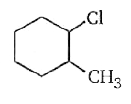Alkyl halides undergo :
Electrophilic substitution reactions
Electrophilic addition reactions
Nucleophilic substitution reactions
Nucleophilic addition reactions
The correct Answer is:C
To solve the question regarding the reactions that alkyl halides undergo, we can break down the process step-by-step.
Step 1: Understanding Alkyl Halides
Alkyl halides are organic compounds that contain a carbon atom bonded to a halogen atom (F, Cl, Br, or I). The general formula for an alkyl halide can be represented as R-X, where R is an alkyl group and X is the halogen.
Hint: Remember that the halogen atom is more electronegative than carbon, leading to polarization in the bond.
Step 2: Polarization in Alkyl Halides
Due to the difference in electronegativity between carbon and the halogen, the bond between them becomes polarized. This means that the carbon atom develops a partial positive charge (δ+) while the halogen develops a partial negative charge (δ-).
Hint: Think about how electronegativity affects the distribution of electrons in a bond.
Step 3: Nucleophilic Attack
The partial positive charge on the carbon atom makes it susceptible to attack by nucleophiles, which are electron-rich species. Nucleophiles can donate a pair of electrons to the carbon atom, leading to a substitution reaction.
Hint: Recall that nucleophiles are attracted to positive charges.
Step 4: Nucleophilic Substitution Reaction
In a nucleophilic substitution reaction, the nucleophile replaces the halogen atom in the alkyl halide. This process can be represented as:
R−X+Nu−→R−Nu+X−
where Nu^- is the nucleophile and X^- is the leaving group (the halogen).
Hint: Visualize the reaction as a swap where the nucleophile takes the place of the halogen.
Step 5: Types of Reactions
Alkyl halides can undergo two major types of reactions:
1. Nucleophilic Substitution: where the nucleophile replaces the halogen.
2. Elimination Reactions: where the alkyl halide loses a small molecule (like HBr) to form a double bond.
Hint: Consider the conditions under which each type of reaction occurs (e.g., strong bases favor elimination).
Conclusion
Based on the above steps, we conclude that alkyl halides primarily undergo nucleophilic substitution reactions due to the presence of a polarized bond that allows nucleophiles to attack the carbon atom.
Final Answer: Alkyl halides undergo nucleophilic substitution reactions.
Alkyl halides are organic compounds that contain a carbon atom bonded to a halogen atom (F, Cl, Br, or I). The general formula for an alkyl halide can be represented as R-X, where R is an alkyl group and X is the halogen.
Due to the difference in electronegativity between carbon and the halogen, the bond between them becomes polarized. This means that the carbon atom develops a partial positive charge (δ+) while the halogen develops a partial negative charge (δ-).
The partial positive charge on the carbon atom makes it susceptible to attack by nucleophiles, which are electron-rich species. Nucleophiles can donate a pair of electrons to the carbon atom, leading to a substitution reaction.
In a nucleophilic substitution reaction, the nucleophile replaces the halogen atom in the alkyl halide. This process can be represented as:
R−X+Nu−→R−Nu+X−
where Nu^- is the nucleophile and X^- is the leaving group (the halogen).
Alkyl halides can undergo two major types of reactions:
1. Nucleophilic Substitution: where the nucleophile replaces the halogen.
2. Elimination Reactions: where the alkyl halide loses a small molecule (like HBr) to form a double bond.
Based on the above steps, we conclude that alkyl halides primarily undergo nucleophilic substitution reactions due to the presence of a polarized bond that allows nucleophiles to attack the carbon atom.
Topper's Solved these Questions
Similar Questions
Knowledge Check
Aryl halide undergo :
AFittig reactionBUlmann reactionCWurtz reactionDGrignard reagent synthesisWhich of the following alkyl halide undergo rearrangement in SN1 reaction ?
ACH3−CH3∣C∣CH3−C∣IH−CH3B C
C DAll of these
DAll of theseWhich of the following alkyl halides will undergo SN1 reaction most redily ?
A(CH3)3C−FB(CH3)3C−ClC(CH3)3C−BrD(CH3)3C−I
Tertiary alkyl halide undergoes solvolysis in either acetic acid or in ethanol .
(a) What is the solvolysis product in each solvent
( b) In which solvent reaction is more rapid and why ?
View SolutionAlkyl cyanides undergo Stephen redyction to produce
View SolutionWhich of the following alkyl halide will undergo SN1 reaction is
View SolutionWhich of the following alkyl halides will undergo SN1 reaction most redily ?
View SolutionWhich of the following halides undergo E2 elimination?
View Solution
